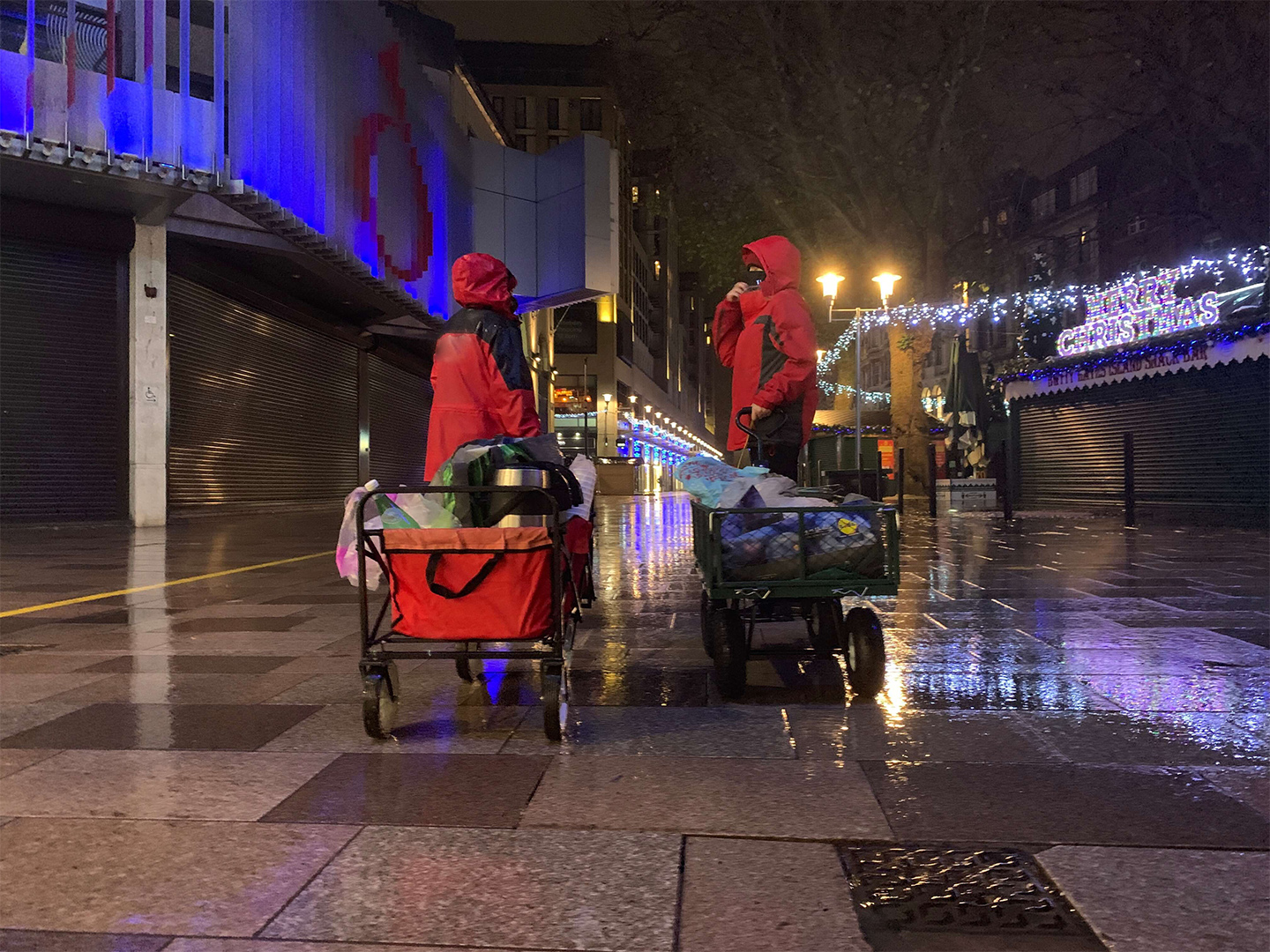Homelessness in Cardiff hit its lowest levels for six years last March – there were 30 known rough sleepers. By November 20, this number had fallen to 10. I spent an evening helping to deliver food to those who remain on Cardiff’s streets.
Nicola Williams is the co-founder of the charitable organisation Cwtch-Up. When she’s not delivering food to Cardiff’s homeless, Nicola collects and distributes food parcels all over Cardiff to others who are stuggling during the pandemic. When praised by other people, Nicola becomes embarrassed and shrugs away any compliments.
Respectively, arriving at our meeting point for the night, I am reasonably surprised to find Nicola attempting to calm an angry taxi driver who she has accidently blocked in. When she spots me, she smiles cheekily. I suppose she did say she preferred homeless people.
After brief reintroductions, I help Nicola and Cwtch-Up co-founder Justine Heydon unload food and supplies into quickly constructed tow carts. The two veterans wear long red raincoats. It is a cold drizzly Wednesday evening.
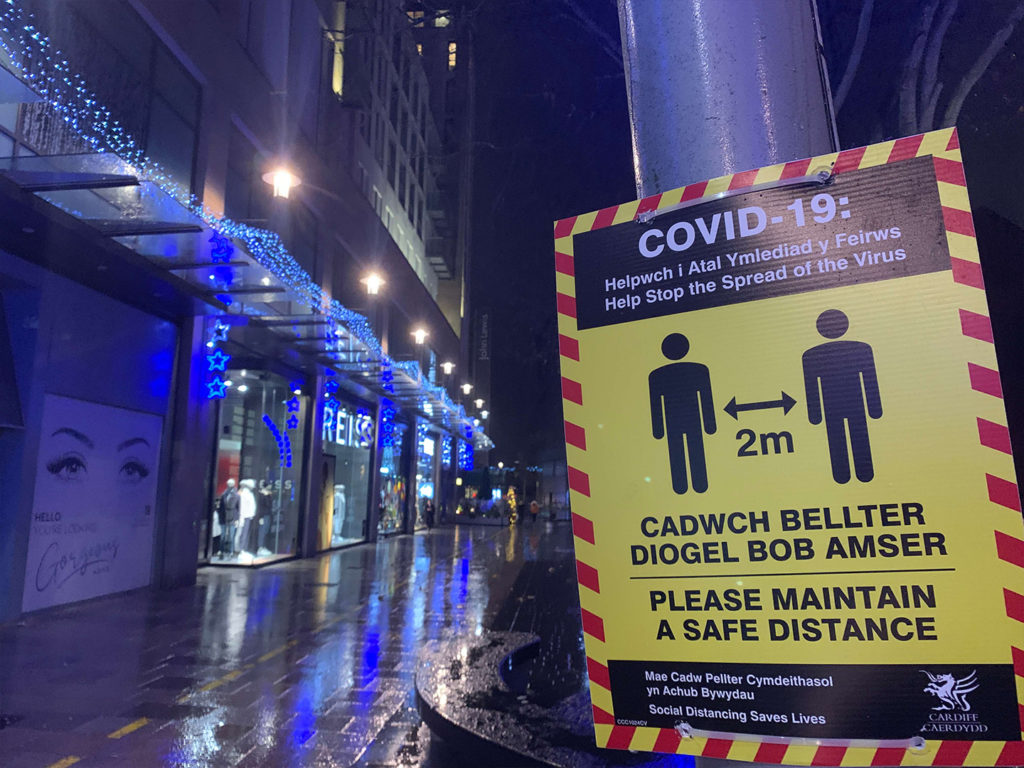
At the start of the pandemic, Cardiff Council was housing 140 people in emergency accommodation and 600 people in hostels and staff-supported accommodation. They were tightly packed and unable to socially distance or isolate. £10 million pounds of extra funding was made available by the Welsh Government and 182 new units of accommodation were sourced. These new sites have 24-hour support and security teams and provide three meals a day to encourage people not to leave.
However, this alone has not reduced the number of people sleeping rough in Cardiff. In fact, on average, more new people are presenting as homeless now than before the pandemic – 45 per week now compared to 25 per week before. The reduction in people sleeping rough can partly be seen as a side effect of the creation of self-contained accommodation units. These units, designed for homeless people to isolate and socially distance in, have ended up helping them adapt to life indoors.
“They’ve put up teddies, ornaments and pictures on the shelves in their individual rooms. That’s what we all do – we make our place our home,” says Councillor Lynda Thorne, chair of Cardiff Council’s Homeless and Vulnerable Persons Board.
As I set off with Nicola and Justine, the drizzle of rain becomes a wet mist.
“There are fewer people sleeping rough,” Nicola says, “but it’s tough for those who are left.”
“People are working and shopping from home, so homeless peoples’ income from begging has disappeared. One of my colleagues came on a food run having been away for a while and was shocked at how skinny our boys were.”
One of the first people we encounter is Gareth Bowen, who stands and greets us warmly. When Nicola and Justine offer him food, Gareth is very careful not to appear greedy. “Really? Are you sure? Oh, thank you,” he says each time. Nicola and Justine make sure Gareth takes three portions of homemade stew.
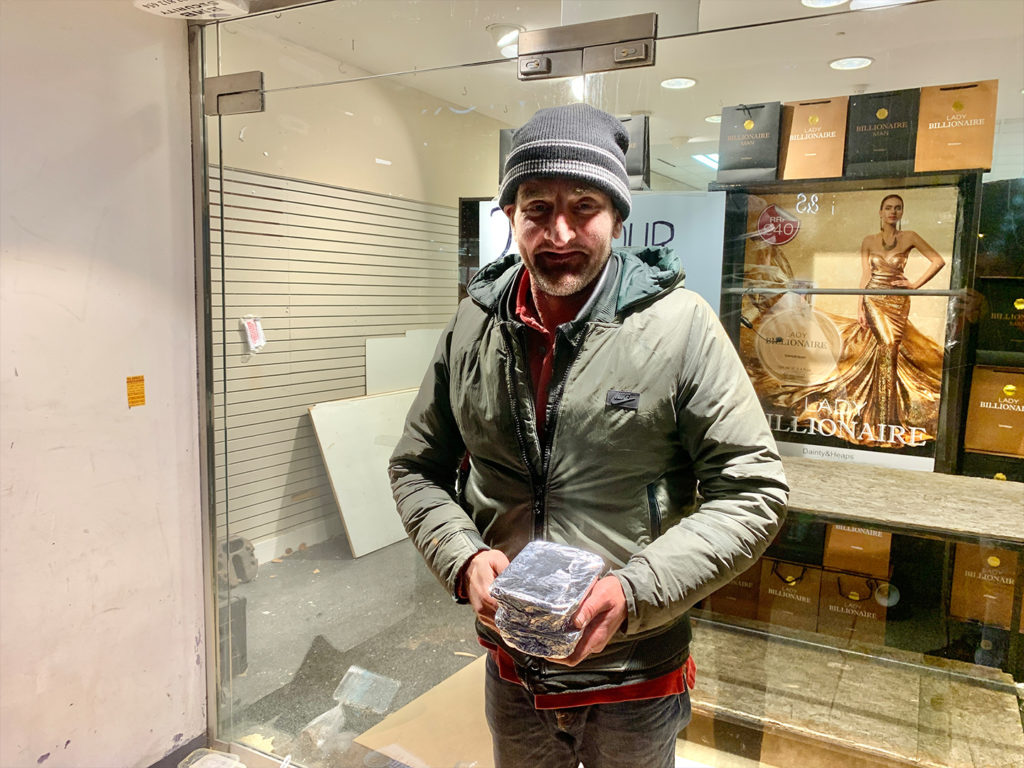
Gareth says that the owners of the shop whose doorway he is sleeping in have told him he is more than welcome to stay: “George [the security guard] brings me water and keeps an eye out for trouble on the security camera.”
I notice Gareth has a notepad and pen on the floor and ask what he has been writing.
“That’s my book,” he says.


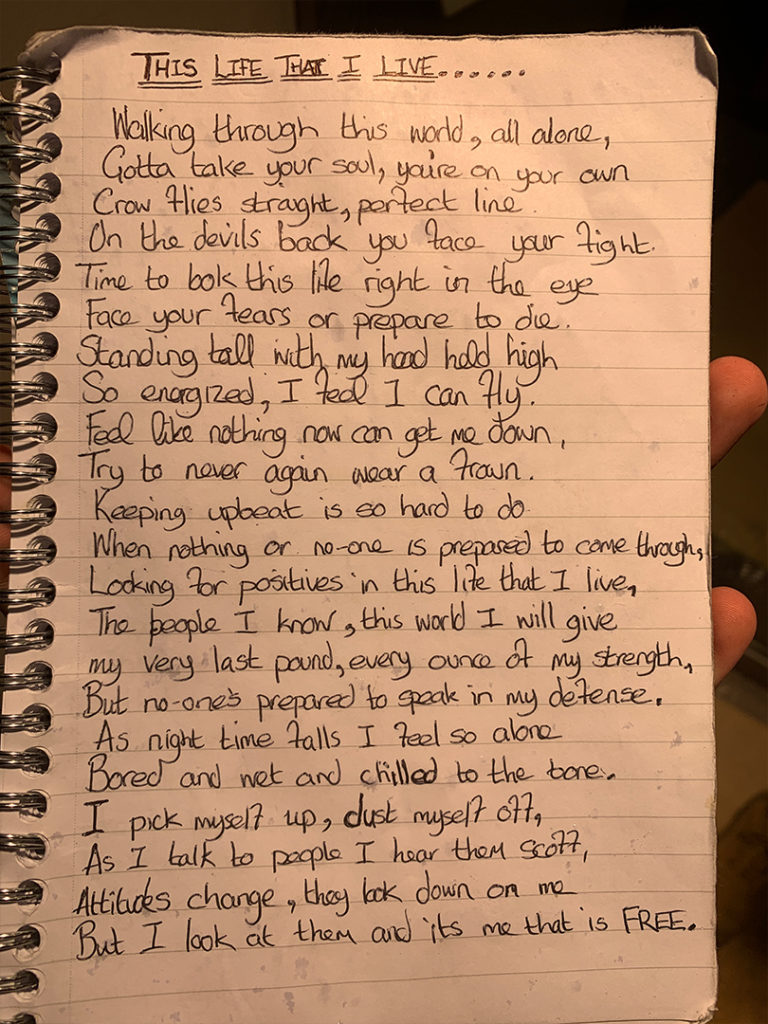
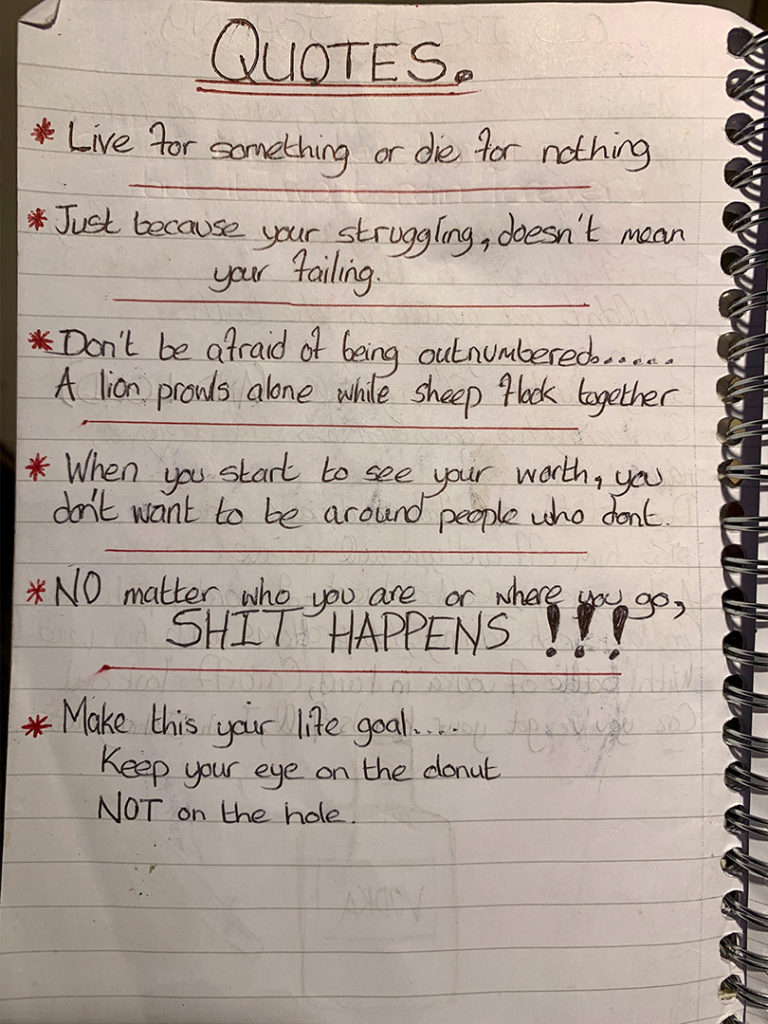
Gareth says writing “Words from the Street” has been a lifeline for him. After losing his job at the beginning of the year, Gareth was illegally evicted for missing rent payments. Originally from Caerphilly, Gareth’s lack of local connections means he is low on the list when it comes to getting floorspace and accommodation.
I ask Gareth what the hardest thing about being homeless is. “What hurts the most is saying hello to people and not even being acknowledged,” he says.
Since March 26, 2020, it has been illegal for landlords to initiate court action to evict a tenant without three months’ notice (increasing to six months in September). Once this ban ends, the number of homeless people in Wales will inevitably increase.
“My fear is that with so many people losing their jobs at the minute there will be a big increase,” Councillor Thorne says.
“Although the council is building council houses, they are not building enough to house those on the waiting list and those who are homeless.”
As the evening progresses, we encounter lots of different homeless people and the diversity of peoples’ situations becomes apparent. Some people walk around with nothing but the clothes on their back. Others carry bulging bags of clothes as if they have been kicked-out of their house that very evening.
Inevitably, there was a living timeline of drug abuse. Young men would stumble around, just about managing to hold a cup of coffee with barely a mark on them. The same could not be said for the older drug users – most were barely coherent. Nicola and Justine provided the same level of care and attention in every case.
Drug abuse and mental health issues remain a significant problem among homeless people. 24-hour support teams at the new accommodation sites have enabled counselling and treatment to be provided more easily, however the needs of each person differ from case to case.
“Housing homeless people is just part of the problem. You can take someone off the street and put them in a flat, but that does not address their personal issues. Many just get evicted, it’s like a revolving door,” Councillor Thorne says.
She describes one individual who has been housed and returned to the streets as many as 58 times.
In May 2020, the Welsh Government announced a further allocation of £20 million to assist in tackling homelessness as part of the “No Going Back” approach. A key component of Cardiff’s approach is the opening of an Assessment Centre on Cowbridge Road. The centre will assess homeless people’s needs and stream them into specialised hostels appropriately, but its opening has been delayed due to coronavirus.
“Many of those new to living on the street perhaps don’t have such severe issues. It is those that have been in this revolving door for many years that often need that extra support,” said Coun Thorne.
“At the moment, it’s hard to build these peoples’ trust because they’ve been through it all before. Maybe in five or six years-time, working with people who are new to the streets, we’ll have these things in place straight away.”
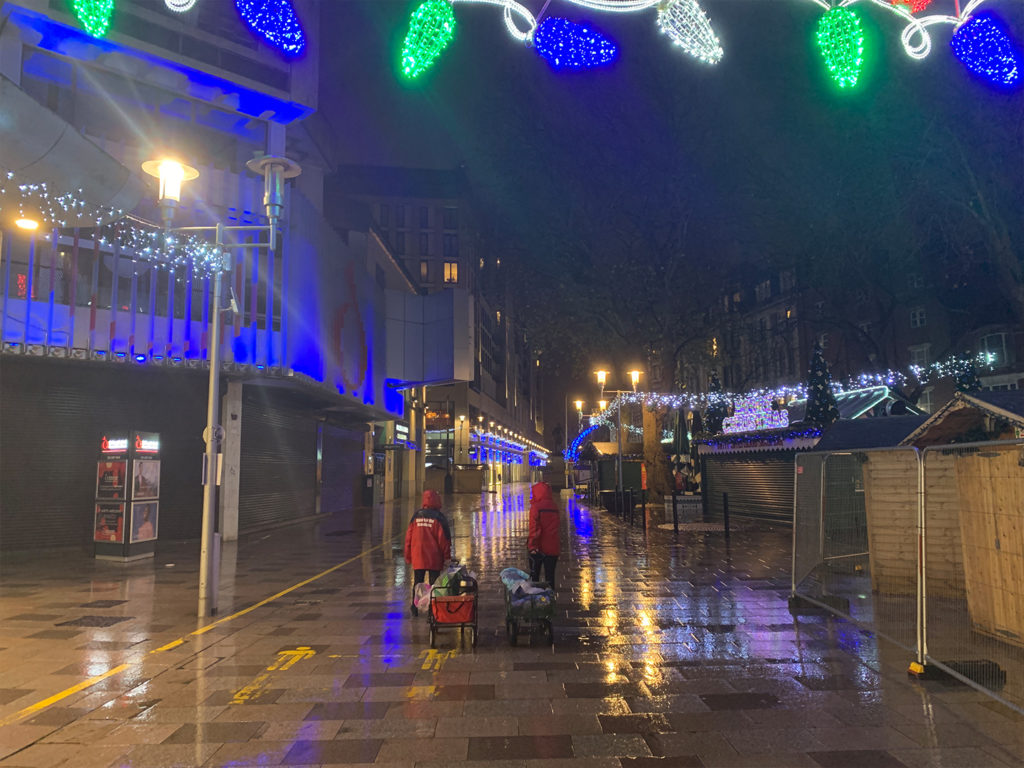
Although both Nicola and Justine acknowledge the reduced number of homeless people out on Cardiff’s streets, the food trollies soon begin to empty and we begin the loop back to the car.
At the start of the night, Nicola had described the homeless people in Cardiff as her friends. Only after seeing her finish every single conversation did I really appreciate this to be true. It was often like watching old friends catching-up with each other.
“A lot of them don’t get to talk to many people so we do natter on a bit,” Nicola jokes.
Similarly, food was offered to the homeless people as though they were visitors in Justine and Nicola’s home. It was not seen as something they should be intrinsically grateful for and polite expressions of preference were generously accommodated.
“They are human beings at the end of the day,” she says.
“I think the volunteer groups do amazing work,” says Councillor Thorne, who is looking to form a partnership with groups like Cwtch-Up.
“At the moment we can’t have volunteers in the hostels because of the pandemic, but we don’t want to risk encouraging people back onto the streets. The self-contained units and hostels do have food on-site.
“The puzzle pieces are out there on the table, but they’re not all put together yet.”
As we finish our loop of town, both carts emptied of food and clothes, I remember Nicola’s original words when she had agreed to let me come along:
“Be ready to get stuck in.”
Nicola fractured her spine earlier this year after falling off a horse. Despite this, it had taken polite insistence for her to allow me to pull the heavily laden food cart on her behalf. In a year that has forced the postponement of so many social services, at least the homeless people in Cardiff centre that night were happy that Nicola lives by her own words.
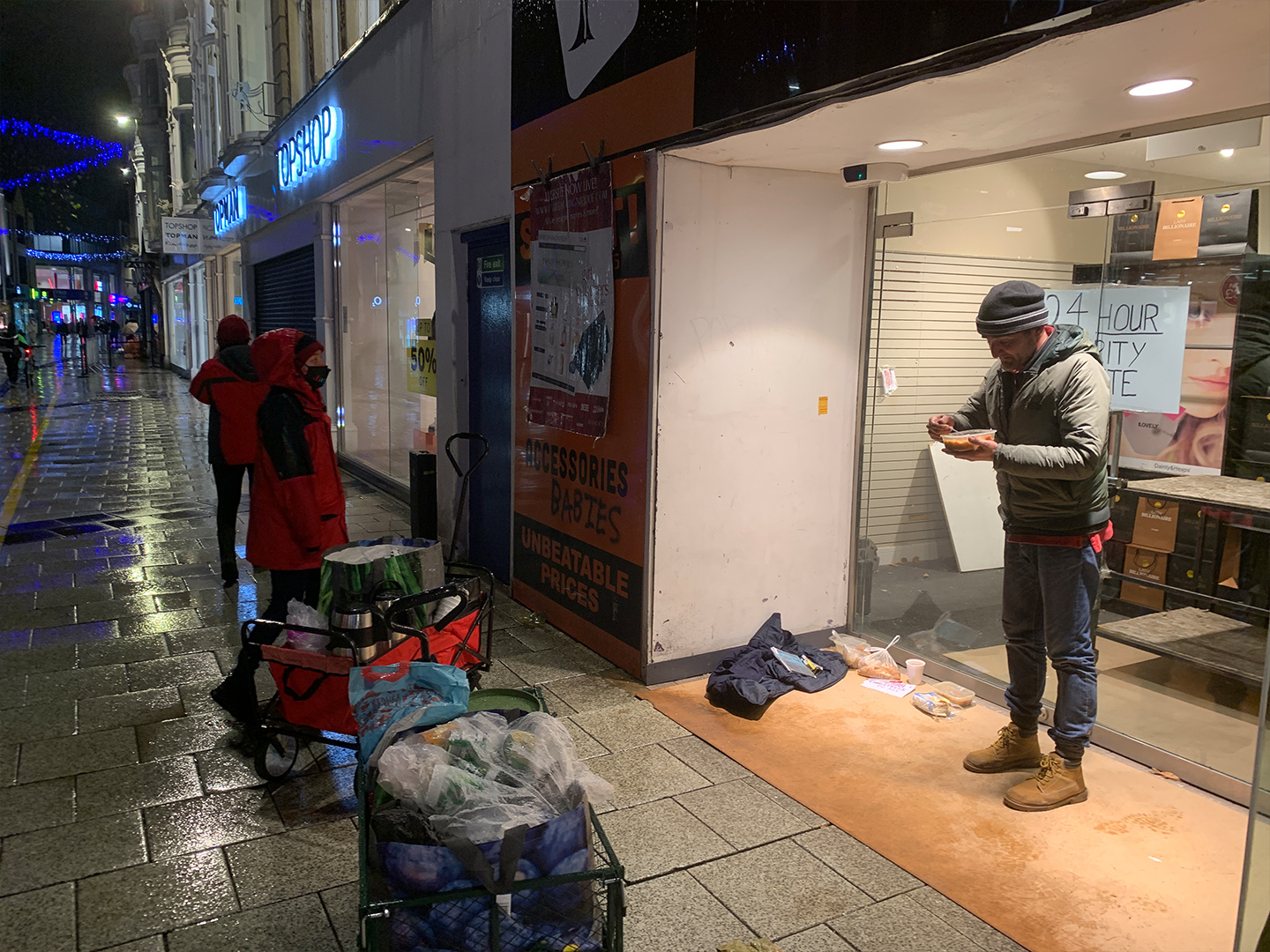
“Just because you’re struggling, it doesn’t mean you’re failing”
A quote from “Words from the Street” by Gareth Bowen


